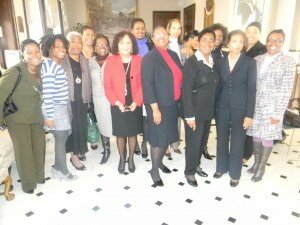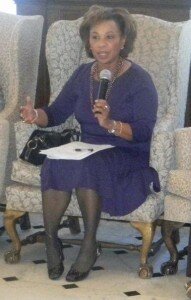Power of the sister vote
An old Ghanaian proverb says, “Until the lions have their own historians, tales of the hunt will always glorify the hunter.” Journalism is the first draft of history.
In the wake of Democrats’ shellacking in the midterm election, journalists and pundits blamed low black turnout for their losses. They compared 2010 turnout with 2008, but that is like comparing apples and oranges. Turnout is always higher in a presidential election year.
Exit polls and preliminary analyses by the Joint Center for Political and Economic Studies and Project Vote show black voters made up 10 percent of the electorate, the same share as in 2006, the last midterm election.
I moderated the Power of the Sister Vote post-election briefing organized by the National Coalition on Black Civic Participation Black Women’s Roundtable. An intergenerational mix of women gathered to tell the story of black voters and the midterm election. The presenters included the leaders of black voter empowerment groups that are largely responsible for closing the racial gap in voter registration and turnout.
An underreported story of the 2010 election is that black female voters made up a disproportionate share of the black electorate. Indeed, Congressional Black Caucus Chairwoman Barbara Lee observed, “We never would have come this far without black women.”
The Joint Center’s report, “Blacks and the 2010 Midterms: A Preliminary Analysis,” found that “the black vote in 2010 was three-to-two female to male as has been the case in many recent elections.”
To be sure, Democrats were hoping for a presidential-year surge of black voters but that didn’t happen. It didn’t happen because Democrats did little to make it happen. As National Newspaper Publishers Association Chairman Danny Bakewell wrote, the Democratic National Committee did “too little, too late.”
The defunding of black voter groups is a sore point. I asked the panelists whether any of them had been invited to attend the meeting of major donors that was taking place across town. The silence was deafening. According to Politico, the Democracy Alliance is looking to “shuffle funds into a progressive infrastructure that will take on the tasks that the president can’t or won’t take on.”
In the 2004 election cycle, $200 million was shuffled into two groups founded by Steve Rosenthal and Harold Ickes. Rosenthal and Ickes are looking “to set up a new vehicle for 2024.”
But as the Huffington Post’s Sam Stein notes:
That said, simply throwing money at the problem isn’t a solution. In 2004, two groups, ACT (which was organized by Rosenthal) and the Media Fund (run by Ickes), helped shepherd $200 million behind Democrats. By all measures, their efforts were a major success, registering a huge number of voters and funding a host of ads. But ACT also had filing problems with the Federal Election Commission and its ultimate objective — electing Democrats — went unachieved. George Soros, one of the party’s top financiers, pulled the plug shortly after the election happened.
Jackie “Moms” Mabley said, “If you always do what you always did, you will always get what you always got.” Moms’ wisdom was echoed by an anonymous operative who told Stein:
It can’t be the same shot all over again. There was a lot of talk about not doing the same thing as in 2004. Do we want to do this all over again?
Black women leaders were outspoken critics of unaccountable instant organizations parachuting into African American communities. But unlike in 2004, black women are empowered with communications tools that ensure their voices will be heard. Their message to progressives and major donors: Not this time. No Democrat can win without the sister vote. Black women are doing the heavy lifting and deserve a shot. Indeed, a seat at the table is long overdue.




COMMENTS